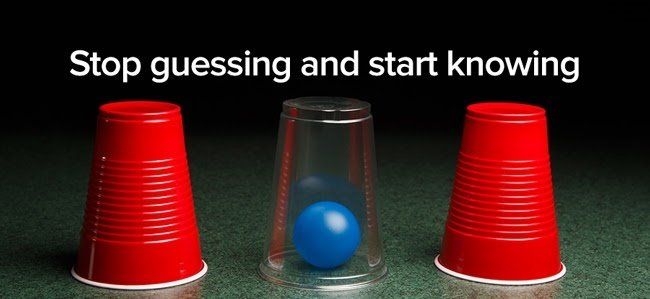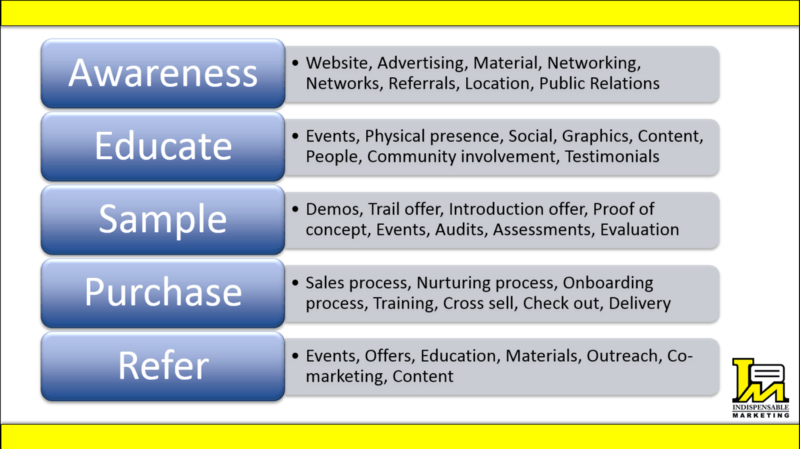How Do You Identify Your Ideal Client?
Recently I’ve been out in the local area talking, presenting and meeting with small business owners on “how do you identify your ideal clients?”

It seems like a simple topic and question — who needs, wants and values your services? How hard could it be to think about? Yet, in my conversations, most small business owners underestimate the time and effort it takes to identify their ideal client, and as a result they:
- sell to anyone and everyone
- simply guess at how to generate leads
- sponsor the wrong events
- compete on price instead of value
- attract the wrong types of clients
- advertise in the wrong places
- waste-time customizing every single proposal
- have no idea what to write about
- create and publish non-interesting material, blogs and newsletters
- optimize their website for the wrong keywords
- communicate irrelevant problems in sales conversations
- restrict the potential of their business
The Cause: Trying to Be Everything to Everyone
Trying to be “everything to everyone” doesn’t work. If you don’t know how to identify your ideal client , how can you possibly attract, sell, support and serve them? It is possible to identify multiple ideal clients, just make sure that you develop targeted marketing strategies for each. Basing your work on specific buyer profiles/personas prevents you from sitting in your office just randomly making stuff up, which is the cause of most ineffective marketing.
Getting Started: How Do You Identify Your Ideal Client?
What you have to do in order to get your ideal client discovery started, is think about the following:
- What do they look like?
- What are their problems?
- How do they want to get informed, educated, sold and served?
- What do they think value is?
I’m going to talk a little more about each of those, but you have to get to the point where you are so sure about how to identify that ideal client, that you are also identifying who your ideal client is not.
Deep Diving Into Identifying Your Ideal Client
It’s really important that you develop the marketing habit of understanding who it is that you’re attracting, identifying them, and building your entire firm around serving them.
Sometimes you strike gold and are be able to quickly identify them, but I’ve experienced that you start with an assumption or idea, and over time, document, observe and analyze to verify those assumptions or idea.
Eventually, your ideal client will find you, mostly because of how your business matures, because of how your messaging gets targeted, and because of the results you’re getting for people like them.
If you’re just starting out you probably won’t have the answer to who your ideal client is.
So you must start with an ideal prospect, and try to prove your ideal prospect hypothesis, but mainly you have to document, observe and analyze.
1. What do they look like?
Identifying your ideal customer starts with things like: Demographics, Psychographics, and Challenges or Problems.
These are the kinds of things you start with, but you must narrowly define these even further or you’ll just be going after any partially defined customer who has a business card in your target market.
- Demographics — Business2Business (B2B) demographics could be the type of industry, the job title of that individual, the years that a company has been in business, and/or revenue levels. Business2Consumer (B2C) the demographics could be age, sex, illness, income, and a particular area of town.
- Psychographics — Understand where do they hang out, what do they read, what do they listen to, what do they search online, what makes them tick, what triggers them to go looking for a solution
- Challenges or Problem — Marketing is about solving customer problems, whether those are problems customers are currently facing, or problems they will face as their marketplace evolves and their needs change.
2. What are their problems?
No matter what you sell — a product, a service, a subscription, etc. — you’re selling a solution to a problem … and people are looking to get their problems solved.
The business owner who can understand the problem the best is most likely the one that gets the business. In almost every case, the act of solving problems should be the primary focus of any engagement with a prospective customer.
A recent survey found that 80% of buyers don’t believe that the salespeople they deal with understand their business.
74% of B2B buyers choose the salesperson who was first to add value and insight in their buying process.
Clearly, insight into the problems customers are having is key because very few people want what you sell. That’s not a blow to you or your business or your solutions. I’m sure all are remarkable. People want what they believe they will get, achieve, relieve, dodge, or acquire based on buying what you sell.
For example , a lot my firm’s prospective clients might say things like — I just want my phone to ring, I want to be on the first page of Google, I want more referrals, I want less marketing headaches, I want my website to generate leads, I feel like I’m wasting money on ineffective marketing, etc.
So my firm doesn’t sell strategic marketing or marketing plans or even consulting — all my ideal clients need to know about what we do is:
- We make the phone ring — end of story.
- We get you on the first page of Google — end of story.
- We make more referrals happen — end of story.
- We make marketing headaches go away — end of story.
- We make the website generate leads — end of story.
- We make marketing dollars go to work — end of story.
Another example, a massage practice: They might have the best tables, oils, and most highly skilled therapist but all their customers seem to care about is that their pain and discomfort go away.
So, that’s the promise they need to communicate, shout about and promote. The rest is an expectation — I mean doesn’t everyone in the massage business have highly skilled therapist.
3. How do they want to be served?
What I’m really asking you here is to understand the demands and expectations an ideal customer has first and then discover ways to address those through the interactions they have with your business.
Do ideal customers go all in immediately on everything they buy or are they always looking for a trial offer? Do they attend educational conferences or rarely leave the building? Do they value delivery of information electronically or prefer direct mail? Do they enjoy frequent communication or quarterly communication?
This process starts with viewing your business in 5 stages and discovering how you will move your prospects from awareness of your business/solution, to educate them on the benefits/problems you solve, to sample your expertise/solution, to purchase your core offering, and refer others to your business.

Nothing matters more to a business than how it interacts and services a customer during their experience with that brand. How the customer feels will determine whether your business survives or sinks. The secret to every business organic growth is great customer experiences, not the marketing done in the pages of a magazine, newspaper, trade publication, on TV, social media post or other media outlets.
4. What do they think value is?
“Value is in eyes of the beholder,” so to speak. The difficult part of this question is remembering the beholder is not you. It is your ideal customer. You must come to understand how ideal customers think and determine what value is.
If you want to succeed in business, you must find a way to showcase a differentiation in a way that ideal customers want and value. Quite often your clients value the little things you do that are special.
Interviewing customers is a great way to get insight into what they think value is.
What kind of question should you ask customers? Get started with this one:
What’s the one thing we should never stop doing?
Find out what your customers really value about you, your services/products and your company. This question lets you discover your true differentiator. Is it your friendly staff, the way they get results, your process approach, your 24-hour responsiveness or the way you clean up after every job?
If you try to be all things to all customers, you are sure to fail. The biggest struggle I see small business owners have is deciding who matters. You must spend time identifying what your ideal client looks like before proposing any tactics aimed at lifting sales.




